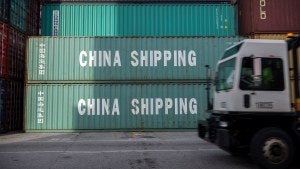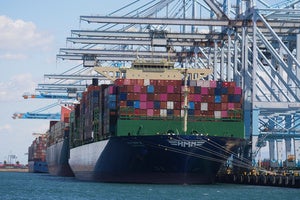Large majorities of the public view international trade as good for the US economy, job creation, and people like them.
A week after announcing his “Liberation Day” tariffs from the Rose Garden, President Donald Trump announced a 90-day pause on their implementation for all countries except China. US financial markets applauded the move, and the Nasdaq posted its biggest one-day gain since January 2001. Global equities similarly rallied on April 23 after Trump signaled willingness to deescalate the tariff confrontation with China, which Treasury Secretary Scott Bessent framed as an opportunity to “rebalance together.”
The economic policies and market turmoil of the first three months of the Trump administration have had a notable effect on American views of trade. A joint Chicago Council on Global Affairs-Ipsos poll fielded April 18–20, 2025 shows most Americans view international trade positively, and a majority now favor global free trade rather than seeking economic self-sufficiency. Large majorities across party lines also say international commerce not only leaves consumers better off but also fosters domestic job creation. Even so, Republicans are notably more skeptical of trade than Democrats and Independents, with half continuing to advocate a pivot to self-sufficiency.
Key Findings
- A majority of Americans (55%) now say the United States should pursue a policy of global free trade, up from just 35 percent in 2024.
- Three-quarters of Democrats (74%) and a majority of Independents (56%) favor a free trade approach; half of Republicans (51%) instead favor reducing international trade and pursuing self-sufficiency.
- Majorities of Americans across party lines view international trade as good for their standard of living (84%), consumers like them (83%), the US economy (79%), and creating jobs in the United States (70%).
- Eight in 10 Americans (79%), and majorities across party lines, say the US-Mexico-Canada (USMCA) free trade agreement is good for the US economy.
- Though most Americans (71%) and majorities of Democrats (92%) and Independents (70%) continue to say the United States should comply with rulings by the World Trade Organization (WTO) even if they go against the United States, Republican support for following WTO rulings has fallen to less than half for the first time in Council polling (48% should comply, 46% should not).
Majority of Americans Now Favor Free Trade
When presented with three options for open and free international trade, limiting trade to a group of friendly countries or striving for self-sufficiency, a majority of Americans (55%) now say the United States should pursue a policy of global free trade. This is up 20 percentage points from June 2024, when just a third of Americans (35%) favored this approach. All partisan groups have shifted to this point of view, but especially Democrats. Three in four Democrats (74%) now favor a free trade approach, up from 43 percent in 2024. Similarly, a majority of Independents (56%) favor free trade, up from four in 10 (40%) last year. Support has also risen among Republicans (34%, up from 20%), though it remains a minority view. Instead, half of Republicans continue to support a policy of reducing international trade and seeking greater self-sufficiency in all areas (51%, similar to 2024’s 55%).
The partisan split may stem from disagreements about both the feasibility and the desirability of the Trump administration’s efforts to reshore US production through tariffs. A March poll by Global Strategies Group/Navigator Research finds six in 10 Republicans (60%) think the tariffs will help American workers versus just eight percent of Democrats, who appear much more pessimistic that tariffs can eventually help bring manufacturing back to the United States. Additionally, Republicans are much more convinced about the inherent desirability of becoming self-sufficient, and they are willing to take a financial hit to do so. In March, a Reuters/Ipsos Survey found 58 percent of Republicans supporting higher tariffs on foreign goods even if doing so increased prices, compared to just five percent of Democrats.
These distinctly different perspectives on trade and the economy may also explain why a third approach to trade—creating a trade bloc of friends and partners while excluding other nations—remains unpopular with the American public. The Chicago Council/Ipsos survey shows that just 12 percent of Americans say the United States should take this approach to trade, with similarly low levels of support across partisan groups.
Views of International Trade
Americans overall view international trade as good for their standard of living (84%), consumers like them (83%), the US economy (79%), and creating jobs in the United States (70%). Favorable views of international trade rose sharply under the first Trump administration before falling in 2020 during the global coronavirus pandemic. With the return of Trump to the White House, favorable views of trade are rising once again. In fact, American views of trade as good for job creation and their standard of living are now at all-time highs in the Council’s two decades of polling on trade.
This view of international trade as being broadly beneficial to Americans and the United States extends across partisan lines. Very similar and large majorities of Republicans, Democrats, and Independents view international trade as good for their standard of living, for consumers like them, and for the US economy. Additionally, more than three-quarters of Democrats (78%) and roughly two-thirds of Independents (68%) and Republicans (65%) view international trade as good for creating jobs in the United States.
Partisan views on international trade and job creation have shifted dramatically over the past two decades. In the 2000s and early 2010s, Americans tended to view international trade as bad for creating jobs in the United States. However, under the first Trump administration, views changed sharply across party lines, and record majorities of Republicans, Democrats, and Independents all said trade was good for creating jobs. While Republican attitudes on trade and job creation turned more negative under the Biden administration, the return of Trump to the White House has once again sparked a revival of Republican approval of trade.
One potential explanation for this back-and-forth movement on trade among Republicans is a different perspective on trade and its value compared to Democrats. For Democrats, international trade is part of a broader package of commitments including multilateralism and internationalism; moreover, support for free trade now stands in opposition to a president that Democrats deeply dislike. Republicans, by contrast, now associate international trade with Trump, whom they broadly support. Republicans’ restoration of positive trade views reflects that change in administration, their support for Trump’s tariff-based approach, and their concomitant higher expectations for American economic performance.
These differing perspectives also help explain the seemingly contradictory views of trade among Republicans, many of whom see international trade as beneficial and yet also want the United States to seek greater self-sufficiency.1 In this view, international trade is less about the United States buying goods made overseas and more about the world buying American-made goods, a shift facilitated by high tariffs on foreign imports. Polling from earlier this year supports the idea that Americans—including most Republicans—see trade as a boon for American production because of the access it affords to global markets. According to the most recent Gallup World Affairs poll, fielded February 3–15, 2025, eight in 10 Americans (81%) say foreign trade is more of an opportunity to boost American economic growth through increased exports (81%) than a threat to the economy from foreign imports (14%). This level of support for trade is highest in Gallup polling since the question was first asked in 1992, with the recent spike driven primarily by a sharp rebound in Republican enthusiasm for trade after Trump’s return to office.
US-Mexico-Canada Free Trade Agreement
In addition to viewing international trade as good for the US economy, most Americans also view the US free trade agreement with Mexico and Canada (USMCA) as good for the US economy (79% overall). First renegotiated in 2018 by the first Trump administration as an extension of the North American Free Trade Agreement (NAFTA), the USMCA faced some resistance from Democrats before further revisions the following year garnered bipartisan support. Chicago Council polling shows continued support for the USMCA regardless of partisan affiliation since it came into force in 2020.
Though non-USMCA-compliant energy, potash, and goods imports have been subject to tariffs since March 7, 2025, the administration also granted a tariff exemption to goods that comply with the USMCA rules of origin. As a result, the deal still potentially shields roughly half of Mexican imports and 38 percent of imports from Canada from the full force of the new trade barriers.
Growing Partisan Divisions on Complying with WTO Rulings
Despite the general bipartisanship on international trade’s impact on the United States, there is one element of international trade that no longer has bipartisan support: complying with rulings from the WTO that go against the United States. From 2002 through 2019, when this question was last asked, majorities across party lines favored complying with WTO rulings. Today, seven in 10 Americans overall (71%) and majorities of Democrats (92%) and Independents (70%) favor doing so. But Republicans are divided (48% should comply, 46% should not comply, 5% not sure)—and though Republicans have always been less supportive of complying with WTO rulings against the United States, this marks an all-time low in Council polling.
Conclusion
In a pivot from last year, Americans are rediscovering their passion for free trade. As the administration tries to remake the global economic order through tariffs and bilateral trade deals, Americans today are more united than ever in their belief that an all-out decoupling from world trade is not in their best interest.
Though support for trade crosses party lines, different partisans have differing motivations for viewing trade as beneficial for the United States and for themselves. For Democrats, support for international trade—and free trade in particular—likely reflects their broader commitments to multilateralism, their deep dislike of President Trump, and their concerns about the immediate economic prospects of the country. By contrast, Republicans’ return to confidence in trade reflects the change in administration, with their perceptions of trade and the economy closely tracking the views of those currently occupying the White House.
As was the case in the first Trump administration, the American public is reacting to dramatic policy shifts with significant shifts in their opinion on the best policies for the United States to pursue. Should the ongoing trade war with China result in significant economic harm to Americans, the public’s stance on trade—and trade restrictions—is likely to shift again.
- 1
In fact, a majority of Americans who want the United States to reduce international trade and seek greater self-sufficiency nonetheless view international trade as good for their standard of living, the US economy, consumers like them, and creating jobs in the United States.
This analysis is based on data from a joint Chicago Council on Global Affairs-Ipsos survey. The survey was conducted April 18–20, 2025, using Ipsos’ large-scale, nationwide, online research panel, KnowledgePanel, among a weighted national sample of 1,019 adults 18 or older living in all 50 US states and the District of Columbia. The margin of sampling error for the full sample is ±3.2 percentage points, including a design effect of 1.10.
The data for the total sample were weighted to adjust for gender by age, race/ethnicity, education, Census region, metropolitan status, and household income using demographic benchmarks from the 2024 March Supplement of the Current Population Survey (CPS).
Specific categories used were:
- Gender (Male, Female) by Age (18–29, 30–44, 45-59 and 60+)
- Race/Hispanic Ethnicity (White Non-Hispanic, Black Non-Hispanic, Other, Non-Hispanic, Hispanic, 2+ Races, Non-Hispanic)
- Education (Less than High School, High School, Some College, Bachelor or Higher)
- Census Region (Northeast, Midwest, South, West)
- Metropolitan Status (Metro, Non-Metro)
- Household Income (Under $25,000, $25,000–$49,999, $50,000–$74,999, $75,000–$99,999, $100,000–$149,999, $150,000+)





Related Content
 Global Economy
Global Economy
Cécile Shea unpacks how tariffs on Canada and Mexico could affect agriculture, manufacturing, and more.
 Global Economy
Global Economy
Most think Trump is focusing too much on tariffs and not enough on the rest of the economy. A few, however, think trade barriers are worth the price.
 US Foreign Policy
US Foreign Policy
The public generally does not see current US trade policies toward China as benefiting Americans.
